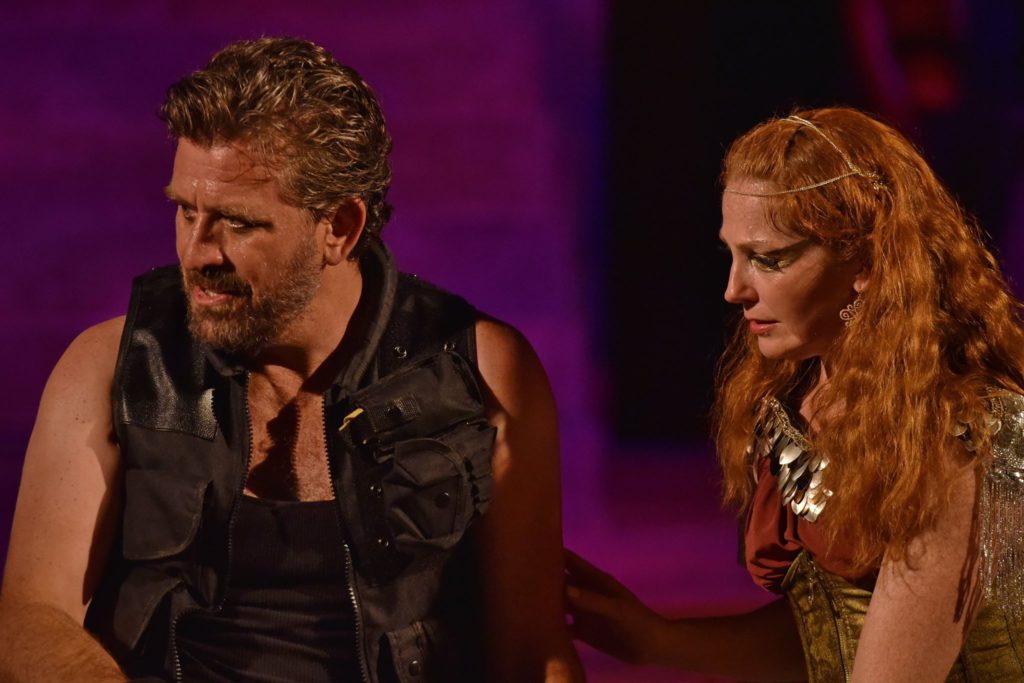
In the Nashville Shakespeare Festival’s new production of Antony and Cleopatra, Egyptian characters are outfitted in bangles and golden dresses, with heavy black eye makeup. The promotional artwork depicts Cleopatra as a dark-skinned woman, which may be historically accurate.
However, the actress playing the leading role is white — a fair-skinned redhead. It’s a casting decision that upset some local actors, who took to social media throughout the summer to criticize the company’s perceived lack of sensitivity.
Antony and Cleopatra is a love story about the powerful leaders of Egypt and Rome. Shakespeare based the play on historical events, but rewrote the plot to suit his own themes.
“To call this a ‘history play’ would be generous at best,” said David Ian Lee, who’s directing the show. “Shakespeare’s playing very fast and loose with known history.”
Because that framing “creates a lot of problems,” his production uses an invented framework. “Our place that happens to be called Egypt, and our place that happens to be called Rome, and our titanic figures that happen to be called Antony and Cleopatra and Caesar — we create them.”
The director wants to challenge local theatre-goers’ preconceptions, in part by removing the play’s historical baggage. In the world of this production, Lee sees Cleopatra’s race as a non-issue. However, the costumes (and the image of Cleopatra on the show’s programs) remain stereotypically Egyptian.
Casting white actors in similar roles has caused controversy on the big screen:
Gods of Egypt, released last year to tepid reception,
was criticized for casting bankable white stars like Gerard Butler.

According to longtime artistic director Denice Hicks, the Shakespeare Festival takes issues of diversity and representation seriously.
“Hamlet says we hold the mirror up to nature; that’s the purpose of playing,” Hicks said. “The representation part of our vision has to do with making sure that our full community sees themselves onstage.”
Hicks admits that she expected a non-white actress to play Cleopatra, but the character’s age made it more difficult to find a performer of color. Hicks says the story calls for a woman of a certain age — “beyond her childbearing years.” According to Hicks, the middle-aged actresses who showed up for last spring’s auditions were white.
Some critics remain unsatisfied with that explanation.
On Facebook, members of the Nashville theater community offered alternatives: the casting notice could have
requested actresses of color, and the creative team could have brought in talent from out of town.
Shawn Whitsell, who produces Nashville’s Shades of Black Theatre Festival, was active in online discussions around
Antony and Cleopatra. He said the festival didn’t go far enough in its approach to casting. Whitsell sees the situation through the lens of his own work as a producer, which includes a recent project with an entirely Hispanic cast.
“I knew it was my responsibility as a producer on the show to go above and beyond,” he said. “So that meant a delay in casting, that meant contacting strangers and organizations and combing through Facebook, talking to people who weren’t even actors.” Whitsell said those steps are sometimes necessary.
The Shakespeare Festival has gone to extraordinary lengths at times, including the company’s 2013 production of
Othello. For that play, in which the title character is a black man, the company didn’t even schedule the show until pre-casting the lead: former NFL Titans running back Eddie George.
Jon Royal directed that production. He’s disappointed by the casting for
Antony and Cleopatra, but not surprised.
“When things like this happen, it’s just typical,” Royal said. “I mean, not necessarily of this company, but just across the board in the business.”
Royal believes the festival cast the most competent performers who auditioned. Still, he wants to see more theater about people of color, and he takes the response to this show as a sign that Nashville is hungry for those stories.
The team behind
Antony and Cleopatra has been listening to the same conversations. Denice Hicks says she’s already cast the festival’s upcoming production of
Hamlet, with a black actress as the love interest, Ophelia. Her cautious, disapproving father and her hotheaded brother will also be played by black actors.
That’s the kind of show Royal wants to see. “That gives me chills,” he said. “That’s juicy. So if they do that, great. I would love that. But it’s not going to get done unless you lean into it.”
Royal said he’s gratified when modern racial dynamics are brought into classic plays, where consciously employing actors of color can add new layers to old stories.
No matter how that production turns out, Nashville’s artistic community will be watching.
“Even with all the good work that they’re doing at the Shakespeare Festival, that doesn’t mean that it’s impossible to make a mistake,” Whitsell said. “And when you make those mistakes, you have to own up to them and start working on what the future will look like.”


